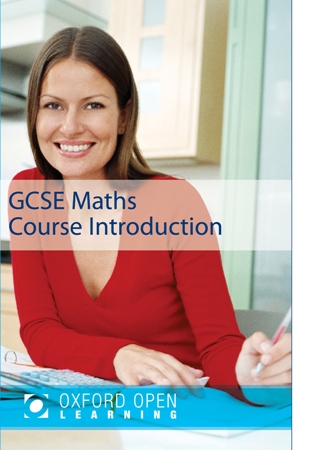- IGCSE Courses
- Biology IGCSE
- Business Studies IGCSE
- Chemistry IGCSE
- Economics IGCSE
- English IGCSE
- English Literature IGCSE
- French IGCSE
- Geography IGCSE
- History IGCSE
- Human Biology IGCSE
- Maths IGCSE
- Physics IGCSE
- Science IGCSE (Double Award)
- Spanish IGCSE
Mathematics GCSE
Maths GCSE is an essential qualification for many jobs and helpful even in those where it is not compulsory. This specification has an emphasis on problem solving and Maths in a real world context. It will teach you to grasp and visualise ideas while using the underlying core mathematical principals. As a result, you will find plenty of problem solving practice within the course.
You will have the choice of studying for the “F” foundation level where the highest grade is 5 or the “H” higher tier where you can get up to grade 9.
Content of the Maths GCSE course
The Maths GCSE course comprises 13 modules. An expanded list can be found in the course introduction below.
The following modules need to be studied by all students.
Foundation Modules
- Module 1 – Numbers
- Module 2 – Money
- Module 3 – Measurement
- Module 4 – Basic Algebra
- Module 5 – Basic Trigonometry and Vectors
- Module 6 – Basic Geometry
- Module 7 – Further Geometry
- Module 8 – Probability and Statistics
The following modules only need to be studied by students aiming for the higher tier.
- Module 9 – Further Numbers and Equations
- Module 10 – Higher Algebra Topics
- Module 11 – Further Geometry and Trigonometry
- Module 12 – Further Probability and Statistics
- Module 13 – The examination
The Maths GCSE Specification
Our Maths GCSE course prepares students for AQA GCSE Mathematics syllabus AQA 8300
We have chosen this syllabus as the most suited to the needs of distance learning students.
Assessment of the Maths GCSE Course
The Maths GCSE syllabus has two tiers, Foundation and Higher. The Foundation level allows students to achieve grades between 1 and 5 or ungraded and the Higher tier allows students to achieve grades between 4 and 9 or ungraded.
You will receive materials covering both tiers and once you have completed the work required to enter for the Foundation tier, you can then choose whether to go on and study for the Higher tier. In effect two courses all for the same fee!
Examination Structure
Irrespective of which tier you enter for, you will sit three exams of 1 hour and 30 minutes. Paper 1 is a non-calculator paper. Papers 2 and 3 allow the use if a calculator.
Online Course or Paper Based? Additional Tuition? It’s your choice!
All of our GCSE students receive:
- Traditional printed learning materials
- Access to our online resources with on-the-go access to all your regular lessons
- The support of a fully qualified teacher online and by phone
- You will have the same tutor through your course which will enable you to build a good working relationship. They generally work some evenings and weekends as well as through the holidays.
- You also have the choice of purchasing extra one to one tutor time on an ad hoc basis for those few occasions when you may feel you need it.
Supporting Resources
MAths GCSE FAQs
- Oxford Open Learning is a long-established educational trust. We take pride in;
- treating every student as an individual
- our friendly and knowledgeable customer service team
- the quality of our courses
- we’re rated ‘Excellent’ on Trustpilot by students who have studied with us.
- we provide online and printed resources so you can study your way – other providers do not give you that choice.
- we make studying your online course easy with our flexible schedule, tutor support, and interest-free payment plan.
Oxford Open Learning is a not-for-profit trust, so you can be sure that your course fees are spent on either your education and tuition or on improving our courses.
Press the “apply now button” and you will find that we certainly do not employ any high-pressure sales techniques. We want you to be comfortable with your choice before committing to a course and so we encourage questions and discussion before you start your journey with us.
Once you are studying, our friendly and experienced staff are always available to give help and advice in person on the ‘phone or by email if you prefer.
Whether you enter for the foundation or the higher tier is largely a matter of personal choice and depends on your own aspirations. Many Oxford Open Learning students only need to obtain a Grade 4 or 5, for example, to get onto a further education course. If this is the case and you have no love of Maths then you should enter for the Foundation papers. The questions are more straightforward but they do require accurate answers.
If you want to go on and study a course which requires the use of maths, you will probably wish to study the higher tier.
It is worth noting that the Oxford Open Learning Trust, like most educational institutions, only accept students onto a Maths A level course if the student has completed the GCSE at higher tier.
This is mostly a matter of personal choice. Both offer two tiers and both will prepare you for further education.
If you are living abroad, then unless you want to return to the UK to sit your exams, you are probably better off sitting the IGCSE.
A fuller discussion of the differences between GCSE and IGCSE can be found here
Please discuss this with your Student Adviser when you enrol, or by phoning us on 01865 798022
We often find that with maturity and some life experience, even students who could not cope with Maths at school are able to face studying it at home.
You are not under time pressure, you have a tutor to help and there are now thousands of examples on the internet to help explain mathematical problems.
Things that were a complete mystery at school, percentages is often a good example, can suddenly become clear.
You can enrol any time you like, the earlier the better. The important thing to think about is when you wish to sit your exam and to give yourself plenty of time to work through your materials and revise successfully. Our cut-off dates for enrolment are usually November for the following summer exams or March for November sittings.
Once you have enrolled, you will get immediate access to your course online and your printed course materials will arrive a few days later.
All the information you need to book your exam with an exam centre can be found in the Student Information section of our website. Here you will find
- detailed instructions on what to do and how to approach exam officers if there is no online booking system
- the entry codes needed to book exams
- our map of examination centres that have helped our students in recent years.
Our experienced Advisers are also always available with a wealth of knowledge about how to locate exam centres and book exams.
OOL students have the advantage of not being tied to sitting with any one centre or organisation and several will offer discounts to our students. Tutors & Exams is one of the biggest operators. They have nine exam venues across the UK in; Birmingham, Bolton, Coventry, Doncaster, High Wycombe, Romford, St Neots, Taunton and Wimbledon.
Our map also shows plenty of other centres that are also very likely to help our students, they may also offer a discount and they could be cheaper. If you have the time it is always worth shopping around.
You should start to look for an exam centre as soon as possible after enrolling and preferably in the Autumn term before your summer exam. There is a lot of demand for Private Exam places and many centres are already booked up well before Christmas. The AQA Exam Board’s final date for booking summer exams without incurring late entry fees is the 21st of February, but do not expect to find many places willing to help at this late stage.
Resit exams are available in November but your choice of centres is likely to be more limited and you will need to confirm arrangements well before the start of the summer holidays.
First fill out our website application form giving as much relevant information as possible and at this stage you have not committed to anything. Once the application has been received and assessed by our Admissions Department, a Student Adviser will contact you to discuss the application, answer any more questions you may have and confirm your subject selections and cost before you get started.
We want you to be comfortable with your choice and clear about the way forward, therefore we do not employ any high pressure sales techniques and you are free to take your time before you commit to investing in any study programme.
Once you are ready, you can pay your Student Adviser in full or arrange to pay in instalments.
There is no upper age limit to studying for a GCSE and we get students who are retired and in their 70’s even 80’s. They often just want to study to keep their brains active and many don’t actually go the expense of sitting the exam. Our tutors love what they can learn from these students
However, most students have just started work and need an extra GCSE to progress or want to switch to a job which requires a qualification they do not have.
If you are under 18 years old then you need our sister company Oxford Home Schooling.
Not surprisingly, many people find the idea of sitting a GCSE with a group of 16 year olds very intimidating but you are quite likely not to be alone.
There is no denying that it can be uncomfortable for a grown up to sit in what is likely to be the cheapest place; a school. Also because of safeguarding, many schools will no longer allow unknown grown ups in to their premises, but there are other options.
The private commercial exam centres all allow grown ups to sit and consequently although you will be in the minority, you will probably not be the only one. Some private schools are still happy to accommodate adults and they will be likely to have the most experienced exam officers.
Exams are not easy for anyone but at least as an adult you will probably have done it before and have the life experience not to panic.
We can print you materials on different coloured paper and because you are studying at home you will be able to take all the time you need to complete your work, but unfortunately we do not have special needs teachers.
When it comes to exams, you may be able to apply for extra time, but if you do not have a current diagnosis then you will need to go through the process of getting one. This can be expensive and time consuming, so please let us know of any special requirements when you apply.
Most of our GCSE and IGCSE courses are fairly self contained and you should not need many if any extra books to complete successfully.
Having said that all students will benefit from reading around a subject and your tutor will be able to advise if any additional reading would useful. These days the internet is an enormous resource both for accessing free materials and buying cheap or second hand books.
The Maths course does have a recommended text book but it is not compulsory. You will find details in the course.
Yes, as well as the summer sitting you can also sit in November. The entry deadline is the 4th October.





